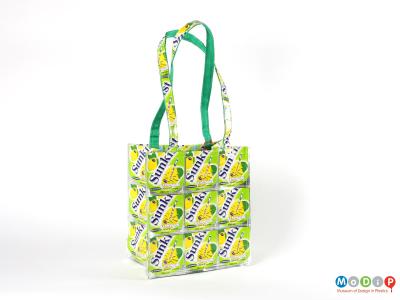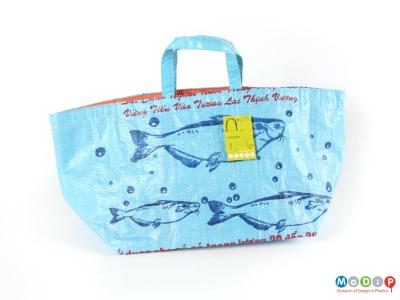Litter, the unlawful disposal of unwanted waste, is the most widespread blight on public spaces and is a problem in many countries. Local authorities endlessly seek ways to resolve the problem in the event of a significant failure to prevent it happening in the first place. Two solutions to the same problem on two continents are shown here.
Carelessly discarded empty water sachets are said to account for the majority of litter pollution in Ghana. Each day in Accra, Ghana's capital city, for example, tons of waste is generated by the careless disposal of thousands of empty water sachets. The cost of cleaning up the streets is an increasing problem and various solutions have been proposed to limit the volume of littering. One imaginative solution (1) has been realized by Global Mamas, a women's co-operative, who by utilizing this readily available resource help to reduce the problem whilst helping its members gain financial independence. The non-biodegradable polyethylene sachets are collected, washed, disinfected and stitched together to transform them into a useful, long lasting product.
Doypacks ®* from which Sunkist drinks pouches are made pose particular difficulties for recycling. They are commonly made from laminated layers of polyester, aluminium and polyethylene thus rendering them impractical to recycle. Many of these pouches end up in landfill or are incinerated, but a large number of them are rescued by women's co-operatives in the Philippines. The bags are bought from private homes, schools, festivals, hospitals, offices and community centres. They are washed, sorted, sanitized and dried before being stitched by seamstresses into useful Doy Bags (2). On occasions, pre-consumer packaging is utilised, packaging that has been rejected by the manufacturers before being put to the use for which it was originally intended.
* Doy bags are so named after the flexible Doypack® invented in 1962 by Louis Doyen for the food packaging industry.
Disposal of once used packaging is an ongoing problem faced by all. Much is not biodegradable and even when discarded in a lawful way still poses difficulties. Alternative solutions to landfill and incineration are found by many workers groups and co-operatives. The blue shopping bag (3) is made from empty rice sacks by a co-operative in Cambodia. The woven polypropylene material is extremely strong. It is originally woven to form sacks strong enough to contain great weights of grain and retains its strength when made into a new object. Similarly the basket (4) is made from discarded polypropylene parcel strapping. Originally designed to retain and secure items for shipping, this material is resistant to moisture and temperature variations, is supple and easily adapts to carton shapes. These qualities are of benefit when the strapping is put to new use. It is sufficiently pliable to be woven into basket shapes and readily retains its new form.
All these products offer alternative solutions to the problem of how to dispose of some of the waste generated by a consumer society in some small way. They provide a means of earning a wage to disadvantaged groups and their sale to western consumers helps to salve the conscience of those of us who wish to help in some part.




